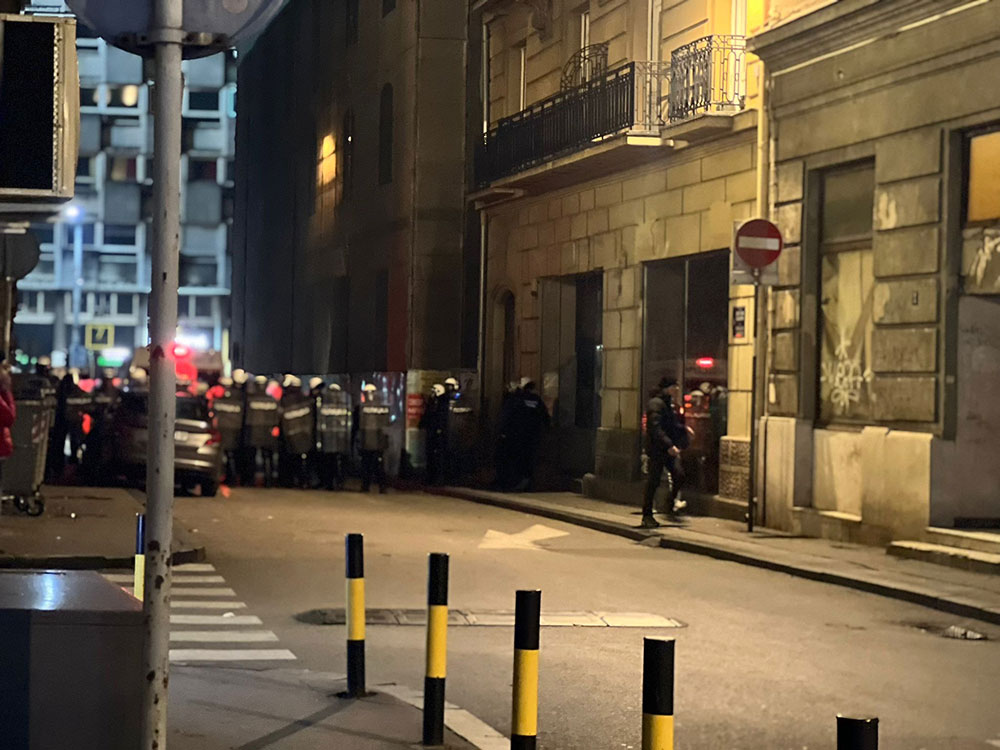
It is becoming clear that the key player in these elections is the police. It was the police who “won” the elections for the ruling party by compiling inaccurate electoral rolls and refusing to delete voters with fake addresses. It was the police who refused to disclose precise data on how many people registered their residence in Belgrade immediately before the elections. The police did not lift a finger to investigate falsified declarations of voter support for the electoral lists. The police did not want (or dare?) to enter the premises of the Belgrade Arena and determine who organized the unusual excursion of voters to the capital. Plainclothes police were on duty in front of several polling stations. Plainclothes police played the role of thugs at the protest (some of them got beaten up while doing it). The police occupied the City Assembly and treated Vladimir Obradović, a member of the Provisional Authority of the City of Belgrade, and the gathered citizens, as hostile trespassers. In the end, the police chased the peaceful protesters through the alleys of Belgrade so that the president could say: they ran away like rabbits.
On the other hand, they did nothing about those who came on Sunday at around 21:15, wearing masks, to cause problems. They were able to return to their homes in peace.
Another key player in these elections is the prosecution. While the criminal actions of the police represent a careful balance of action and inaction, the prosecution excelled more in the latter. This institution responded to the pre-election machinations by “forming a case”, that is, by assigning a number and placing criminal reports received from citizens in an envelope. If they could burn them, they would be happy to do so, but fortunately there is a good enough alternative: the formation of a case followed by a firm determination to do nothing.
Although several prosecutors were on duty in Belgrade on election day, we don’t know if any of them went out into the field and established the facts that were available only on that day – primarily when it comes to the selling of votes, organized bringing of voters to polling stations, distribution of identity cards and filling out ballots in front of polling stations. The basic public prosecutor’s offices were disinterested in their job, and even more so the prosecutor’s office for organized crime. The only one interested in the “election case” was the Higher Public Prosecutor’s Office, which, although it had no jurisdiction, addressed the public six days later saying that the lower prosecutor’s offices had formed several cases, and that they expected help from the police (!) in shedding light on what they consider individual election incidents. Let’s compare the post-election reaction after six days and six nights with the one after the sinking of the floating river club with the symbolic name “Cartel”. In this case, the prosecutor’s office reacted within a few hours because, of course, clubs are more important than the will of the citizens.
Prosecutors were not on the streets on election day, but we know where they were yesterday – at the National Security Council meeting. Although they are not members of this body, three high-ranking prosecutors – Zagorka Dolovac, Nenad Stefanović and Mladen Nenadić – happily surrounded the President of the Republic. What were the three prosecutors doing there? They seemed to be offering their services to the president. He, for his part, wants public confirmation that the prosecutors are still with him, that they are loyal.
With a police and a prosecutor’s office like these, the president is safe, at least from bare-handed citizens. Just one day before the Council meeting, the police arrested and the prosecution charged several students with subverting the constitutional order. The three prosecutors smiled at the president’s big table, instead of running around to investigate who, in what manner and by whose order turned the election into a police action, instead of a civil one.
It is evident that the president of the state is the actual spiritus movens of the collapse of the constitutional order. He has now officially promoted the police and the prosecutor’s office to his own Praetorian Guard. The days behind us have been difficult not because of the unwanted result of the election, but because of the fact that we live in a police state and that is no longer a secret.
That’s why police officers who shed tears over broken windows seem incredibly hypocritical. The former mayor of Belgrade is on the same wavelength, sighing dramatically over the (allegedly) damaged furniture from the 19th century in the City Assembly.
In his performative outrage, Šapić forgot some lessons from school. Serbian democracy, which the citizens are defending on the street, was also created in the 19th century, just like that furniture. It’s just that broken chairs and tables are easily repaired, while repairing a broken democracy takes a lot longer.
Vučić, Šapić and their ilk still seem to be unaware of how history will remember them – as people who compare citizens to small rodents, and call citizens’ desire for justice violence. Because if we treat civil rebellion as violence – what do we call it when one relies on the police to stay in power?
Translated by Marijana Simić
Peščanik.net, 29.12.2023.
- Biografija
- Latest Posts
Latest posts by Sofija Mandić (see all)
- Dogovor koga nema - 19/04/2024
- Dačić’s referendum - 18/04/2024
- Dačićev referendum - 09/04/2024


